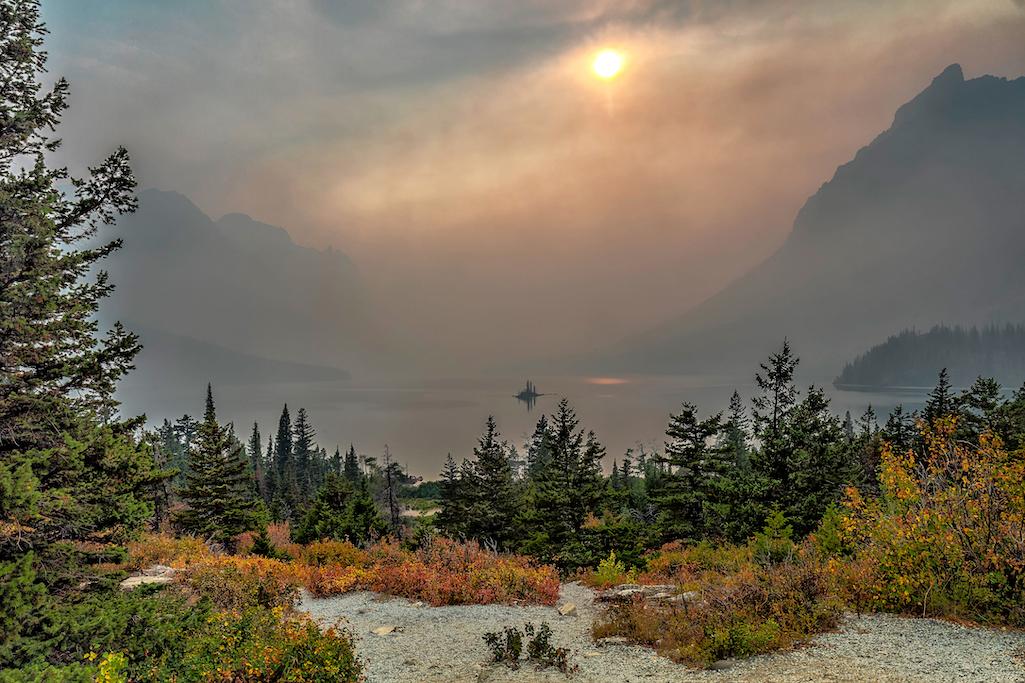
EPA's failure to enforce haze regulations compounds pollution problems national parks face from wildfire smoke, shown in this undated shot of St. Mary's Lake in Glacier National Park, according to environmentalists/Rebecca Latson file
A coalition of environmental groups, including the National Parks Conservation Association, has sued the Environmental Protection Agency for failing to enforce the Regional Haze Rule required by the Clean Air Act. That failure could lead to "continued release of preventable haze-causing emissions that harm the health of our communities and blur landscapes at our most scenic national parks and wilderness areas," the groups maintain.
Among the iconic units of the National Park System impacted by haze are Acadia, Big Bend, Great Smoky Mountains, and Shenandoah national parks.
According to the lawsuit filed Thursday, EPA has failed to approve or reject state haze plans submitted by Kansas, Massachusetts, Michigan, New York, Ohio, Texas and Wisconsin within the 18-month window they have to do so.
The organizations’ lawsuit urges EPA to fulfill its obligation under the Clean Air Act and require big polluters to reduce emissions and increase visibility throughout the country’s public lands. The lawsuit was filed in the U.S. District Court for the District of Columbia by the Environmental Integrity Project, NPCA, and the Sierra Club. The three are represented by Earthjustice and Sierra Club attorneys.
"Haze pollution affects 90 percent of our country’s national parks by muddying some of the most sought-after views and making the air dangerous to breathe," according to NPCA. "In addition, air pollution is particularly harmful for those living closest to facilities who are most often communities of color facing the disproportionate brunt of this industrial pollution. Fossil fuel emissions and other industrial sources intensify the harms of our changing climate, further jeopardizing the health of our communities and national parks across the country and driving up healthcare costs."
Haze is smog-like dirty air caused by sulfur dioxide, nitrogen oxides, and other pollution from coal-fired power plants and industrial sources, which travels across the country, the groups said. The Clean Air Act requires states to reduce their haze pollution that harms any of the 156 U.S. national parks and wilderness areas designated as “Class I Areas,” which receive special air quality and visibility protection.
Among the parks in Class I airshed areas are Guadalupe Mountains National Park in Texas and Isle Royale National Park in Michigan.
“Visitors travel from all over the world to experience clear views and fresh air in national parks. Nobody wants to be met with dirty air and disappointing views, yet haze pollution continues to harm communities’ health and robs people of their ability to enjoy public lands," said Ulla Reeves, NPCA's Clean Air Program campaigns director. "Through their failure to act to protect human health and our environment, EPA is allowing haze pollution to threaten our communities, our health and our parks. It’s well past time for EPA to respond and hold states accountable – we don’t have time to wait."
The same sources of pollution that reduce visibility at Big Bend National Park up to 70 percent are also fueling the climate crisis, and the consequences are alarming, said NPCA.
"Climate change has increased the frequency and intensity of wildfires across the American West, including Yosemite National Park; raised sea levels at the Statue of Liberty and other coastal parks; and accelerated the melting of namesake glaciers at both Glacier Bay National Park and Preserve and Glacier National Park," the NPCA release said. "With 100 million Americans recently under air quality alerts following Canada wildfire smoke billowing across the eastern United States, the need for EPA’s action against ongoing haze pollution for existing plants — and known bad actors — is overdue."


